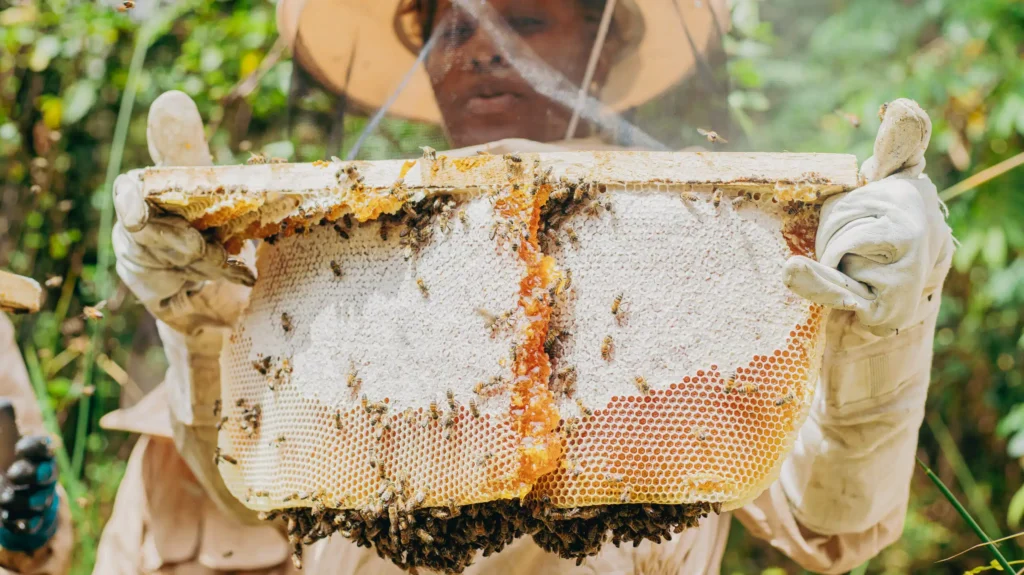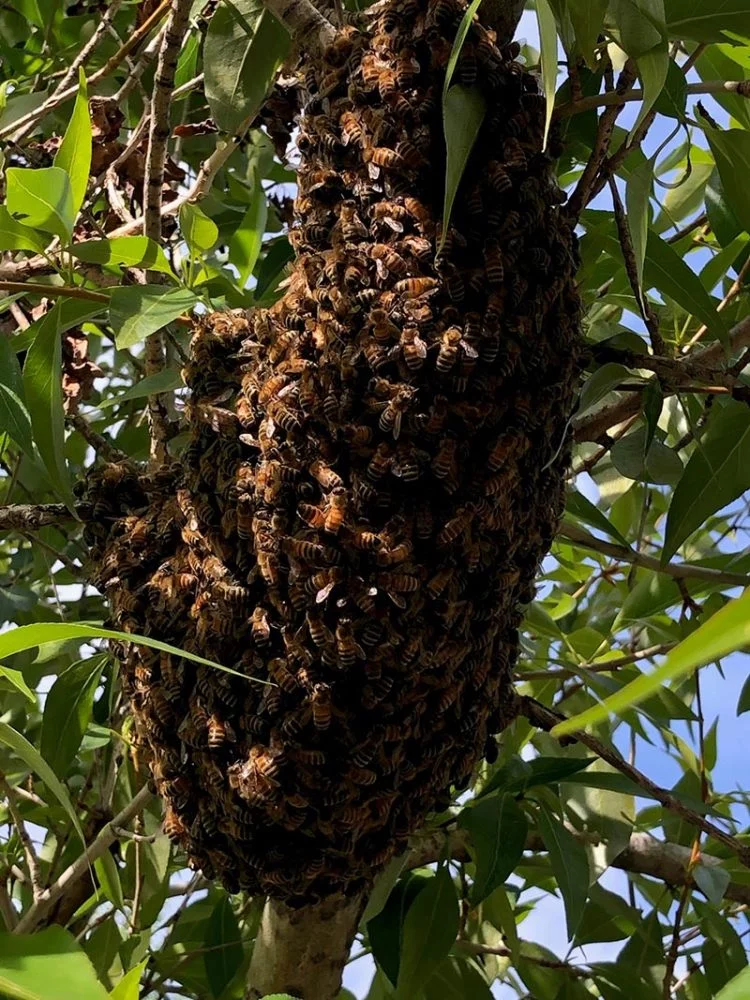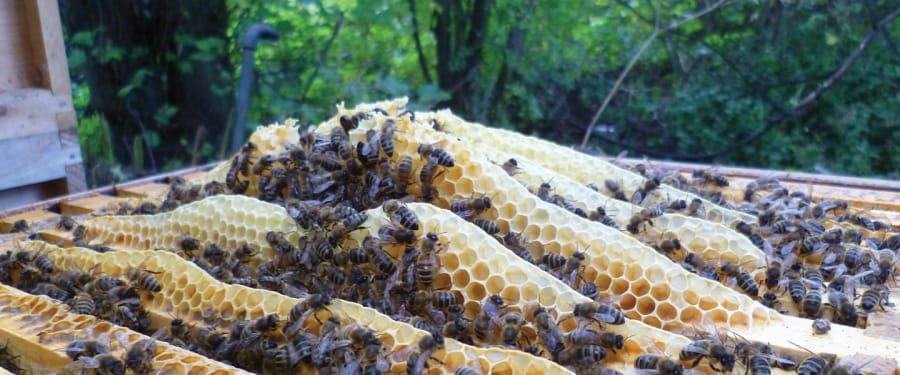Tanzania is a land of diverse ecosystems, vibrant cultures, and rich traditions. Among its many hidden treasures lies the fascinating world of local beekeeping practices, where ancient techniques meet sustainable innovation. Embarking on a beekeeping adventure with Future African Safari offers you a unique opportunity to delve into the intricate processes of honey production, understand the vital role bees play in the ecosystem, and connect with the passionate beekeepers who sustain this essential craft. Join us as we explore Tanzania’s local beekeeping practices and discover the journey from hive to honey.




The Importance of Beekeeping in Tanzania
Beekeeping, or apiculture, holds significant cultural, economic, and environmental importance in Tanzania. It is not only a source of livelihood for many rural communities but also a critical component in maintaining ecological balance through pollination.
- Economic Benefits: Honey and other bee products, such as beeswax and propolis, provide valuable income for farmers and artisans. Beekeeping offers a sustainable livelihood that complements other agricultural activities.
- Environmental Impact: Bees play a crucial role in pollinating crops and wild plants, contributing to biodiversity and the health of ecosystems. Effective beekeeping practices support agricultural productivity and environmental conservation.
- Cultural Significance: In many Tanzanian communities, honey is a traditional staple used in ceremonies, medicinal practices, and as a symbol of prosperity and sweetness of life.
Traditional Beekeeping Practices
Tanzania’s beekeeping traditions are deeply rooted in the land’s history and cultural heritage. These practices have been passed down through generations, preserving the knowledge and techniques essential for successful honey production.
1. Top-Bar Hives
One of the most common traditional beekeeping methods in Tanzania is the use of top-bar hives. These hives are simple yet effective, allowing beekeepers to manage their colonies with minimal intervention.
- Design and Structure: Top-bar hives consist of a long, horizontal box with bars across the top. Bees build their combs downward from these bars, creating natural and accessible structures.
- Ease of Management: This design makes it easier for beekeepers to inspect the hives, harvest honey, and manage bee health without disrupting the entire colony.
2. Log Hives
Another traditional method involves using hollowed-out logs to house bee colonies. Log hives are often used in forested areas where natural materials are readily available.
- Natural Insulation: Logs provide excellent insulation, maintaining a stable internal temperature that is ideal for bee activity.
- Sustainability: Utilizing fallen or sustainably sourced logs ensures that beekeeping practices do not harm the environment.
Modern Beekeeping Innovations
While traditional methods remain prevalent, modern innovations have enhanced beekeeping practices in Tanzania, increasing efficiency and sustainability.
1. Langstroth Hives
Langstroth hives, known for their modular design, are increasingly adopted by Tanzanian beekeepers looking to scale their operations and improve honey yields.
- Frame-Based Design: These hives use removable frames, allowing for easier inspection, management, and honey extraction.
- Scalability: The modular nature of Langstroth hives makes them suitable for both small-scale and large-scale beekeeping ventures.
2. Sustainable Practices
Modern beekeeping in Tanzania emphasizes sustainability, ensuring that bee populations remain healthy and productive.
- Organic Beekeeping: Many beekeepers adopt organic practices, avoiding the use of synthetic chemicals and pesticides to maintain the purity of their honey and the health of their bees.
- Integrated Pest Management: Sustainable pest control methods help protect bee colonies from diseases and parasites without harming the environment.
From Hive to Cup: The Honey Production Process
Understanding the journey of honey from hive to cup highlights the dedication and expertise involved in Tanzanian beekeeping practices.
1. Hive Management
Effective hive management is crucial for maintaining healthy bee colonies and maximizing honey production.
- Regular Inspections: Beekeepers conduct regular inspections to monitor the health of the bees, check for signs of disease, and ensure the availability of sufficient nectar sources.
- Feeding and Nutrition: Supplementary feeding may be provided during periods of low nectar flow to support the colony’s needs.
2. Honey Harvesting
Harvesting honey is a delicate process that requires skill and care to ensure the sustainability of the bee colony.
- Extraction Methods: Beekeepers use traditional tools like knives and smasher boards or modern equipment such as centrifugal extractors to collect honey without damaging the comb.
- Purification: The harvested honey is filtered to remove impurities and then stored in clean containers, ready for distribution or consumption.
3. Packaging and Distribution
Proper packaging preserves the quality and flavor of Tanzanian honey, making it a sought-after product both locally and internationally.
- Eco-Friendly Packaging: Many beekeepers use sustainable packaging materials, such as glass jars or biodegradable containers, to minimize environmental impact.
- Market Access: Future African Safari helps connect local beekeepers with markets, both domestically and abroad, ensuring fair prices and supporting community development.
Cultural and Educational Experiences
Participating in local beekeeping practices offers a rich cultural and educational experience, deepening your appreciation for Tanzania’s heritage and natural resources.
1. Beekeeping Tours
Join guided beekeeping tours to witness the intricacies of hive management, honey extraction, and the daily lives of Tanzanian beekeepers.
- Hands-On Learning: Engage in activities such as setting up hives, harvesting honey, and processing bee products under the guidance of experienced beekeepers.
- Cultural Insights: Learn about the cultural significance of honey in Tanzanian communities and its role in traditional practices and ceremonies.
2. Workshops and Seminars
Attend workshops and seminars that focus on sustainable beekeeping practices, environmental conservation, and the economic benefits of apiculture.
- Expert Knowledge: Gain insights from experts on advanced beekeeping techniques, pest management, and organic honey production.
- Community Engagement: Interact with local farmers and artisans, fostering connections that support sustainable development and environmental stewardship.
Supporting Sustainable Beekeeping with Future African Safari
At Future African Safari, we are committed to promoting sustainable tourism practices that benefit both travelers and local communities. By integrating beekeeping experiences into our safari packages, we offer you a chance to contribute to environmental conservation and economic empowerment.
- Fair Trade Practices: We ensure that beekeepers receive fair compensation for their honey, supporting their livelihoods and encouraging the continuation of sustainable practices.
- Environmental Conservation: Our beekeeping tours emphasize the importance of bees in maintaining ecological balance, promoting awareness and action towards pollinator conservation.
- Cultural Preservation: By showcasing traditional and modern beekeeping methods, we help preserve Tanzania’s rich cultural heritage and empower local artisans and farmers.
Tips for a Memorable Beekeeping Experience
Enhance your beekeeping adventure with these practical tips:
- Dress Appropriately: Wear lightweight, long-sleeved clothing and closed-toe shoes to protect yourself from bee stings during hive inspections and honey harvesting.
- Bring a Camera: Capture the beauty and intricacies of beekeeping practices, but always ask for permission before photographing local beekeepers and their hives.
- Stay Patient and Respectful: Beekeeping requires patience and respect for the bees and the beekeepers. Follow instructions carefully and maintain a calm demeanor around the hives.
- Learn and Engage: Take the opportunity to ask questions, participate in activities, and immerse yourself in the learning experience to gain a deeper understanding of apiculture and its significance in Tanzania.
Conclusion: Savor the Sweetness of Tanzania’s Beekeeping Heritage
Exploring local beekeeping practices in Tanzania is a journey that combines adventure, education, and cultural immersion. From the meticulous care of traditional hives to the innovative techniques of modern apiculture, Tanzania’s beekeepers embody the spirit of sustainability and dedication. By choosing Future African Safari, you not only enjoy an enriching travel experience but also support the preservation of essential environmental and cultural practices.
Ready to taste the sweetness of Tanzania’s honey? Contact Future African Safari today to customize your beekeeping adventure and embark on a journey that celebrates the harmony of nature, tradition, and sustainable development. Experience the magic of bees and the rich flavors of Tanzanian honey, and create memories that will linger long after your safari ends.
Explore more about our safari packages and discover the best of Tanzania with Future African Safari. Your unforgettable African adventure starts here!

